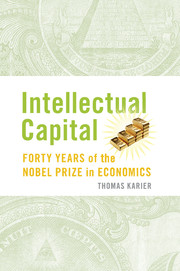Book contents
- Frontmatter
- Contents
- Preface
- Economic Nobel Laureates
- 1 An Economic Prize
- 2 Free-Market Economics
- 3 Micro: The Chicago School
- 4 Stock Market Casino
- 5 More Micro
- 6 Behaviorists
- 7 Keynesians
- 8 Classical Revival
- 9 Inventors
- 10 Game Geeks
- 11 General Equilibrium
- 12 A World View
- 13 Numbers Guys
- 14 History and Institutions
- 15 Reshaping the Prize
- Notes
- Index
- Frontmatter
- Contents
- Preface
- Economic Nobel Laureates
- 1 An Economic Prize
- 2 Free-Market Economics
- 3 Micro: The Chicago School
- 4 Stock Market Casino
- 5 More Micro
- 6 Behaviorists
- 7 Keynesians
- 8 Classical Revival
- 9 Inventors
- 10 Game Geeks
- 11 General Equilibrium
- 12 A World View
- 13 Numbers Guys
- 14 History and Institutions
- 15 Reshaping the Prize
- Notes
- Index
Summary
There were probably no more than twenty Nobel Prize winners in economics when I first started thinking about this book. Trying to find my way around the catacombs of the University of Illinois library stacks, I came across speeches of the first Nobel Prize winners in economics. Here was a fascinating attempt by the laureates themselves to explain their own contributions to a more general, highly educated audience without the aid of mathematics. While not all the laureates fully succeeded in conveying the significance of their accomplishments, they often revealed much about the state of economics as well as their own character and motivation. I started a file about Nobel Prize winners that accumulated over the next twenty years. A lot has changed over this time, including the fact that source documents, once only available in a restricted area of a university library, became widely available on the internet.
The concept for the book finally took shape after I read something totally unrelated to economics, A Brief History of Time by Stephen Hawking. This extraordinary book explained scientific theories without mathematics and included lucid explanations of the achievements of Nobel Prize winners in physics. If it was possible to explain the great ideas of physics, the general theory of relativity, and quantum mechanics, then surely it was possible to explain the great ideas of economics.
- Type
- Chapter
- Information
- Intellectual CapitalForty Years of the Nobel Prize in Economics, pp. ix - xPublisher: Cambridge University PressPrint publication year: 2010



